| |
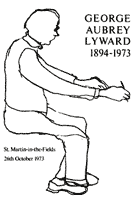

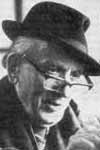

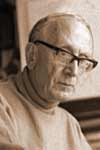

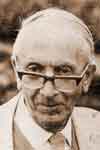

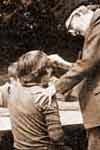 
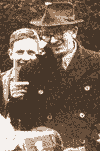 
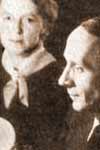 
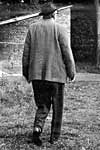

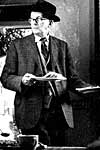

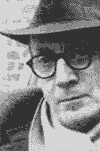

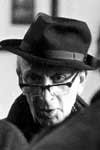

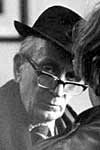

back to
Essays index
|
|
|
No-one who knew him at all well is likely to deny that in
his chosen sphere George Lyward had a gift which can only be
described as genius, by which I mean a gift comparable to
that of a poet, a gift which leaves both the poet himself
and the listener (or reader) face to face with a mystery. Of
that mystery George Lyward was intensely aware and knew that
he had been called to communicate it and co-operate with it
through the exercise of his genius in creative personal
relationships, and above all in the creation of the
community with which his name is always associated, the
community of Finchden Manor.
It would be mistaken to conclude, however, that because
genius is a gift, the exercise of it is easy or painless. It
was certainly not so for George Lyward.
Those who saw him for only brief periods on occasional
visits to Finchden may well have taken away with them the
impression of someone of great strength and independence who
could with equanimity defy custom and bureaucracy and get
away with it. Because he took great risks, people assumed
that he must be very secure, but the full measure of his
achievement can only be understood in the light of his deep
insecurity, and his dependence upon the esteem and
encouragement of others. Complexity and ambivalence are the
clues to any rounded picture of the man.
Apparently secure, yet constantly struggling with a deep sense of
insecurity; fiercely independent of Government and Bureaucracy,
of outside inspection or external financial control, yet personally
dependent on the esteem and friendship of others; warm in his offering
of and longing for friendship, yet ruthless in rejecting those who
appeared to be a challenge to his vocation or his leadership; finding
conventional and organised religion unhelpful (so that he could
say "the moment I enter a church all religion leaves me"), yet claiming
that religion, even more than education, was the main interest of
his life; otherworldly in that his vocation involved a kind of retirement
from the world, yet sybaritic (his own word for it) in that he enjoyed
the comforts of life, and having beautiful things around him.
Himself, as he would sometimes suggest, largely conditioned by
a conventional morality, yet he would never judge anyone else by
those same standards nor, in assessing the ethics of any situation,
would he allow any moral rules to blind him to the reality of the
personal relationships involved. It was these (and not abstractions)
which would determine his attitude.
At Finchden he was the centre around whom everything
rotated, yet he knew that he was not the Centre and that his
role (while accepting temporarily to be the centre) was to
point beyond himself to the mystery which was the Still
Centre of the wheel which represented the changing universe
in all its diversity. These were some of the paradoxical
aspects of the most complex character it has ever been my
privilege to know. Each of these conflicting forces was at
times the cause of acute suffering, but that he never
avoided, and where others of baser metal would have resolved
the tension by some easy surrender, he was able to live with
it and through it, with faith in the eventual positive
outcome.
George Lyward's early life was insecure. His father, an opera singer,
left home when George was very young and visited them only rarely.
His mother worked as a primary school teacher for the princely sum
of £60 per annum and could not support a separate household
herself and her children. The young George, therefore, found himself
as the only male in a household consisting of two aunts, his mother
and two sisters. As a result of an attack of poliomyelitis he had
a weak leg which prevented him from taking part in games.
He suffered a good deal of bullying, both at school and in the street
in Clapham Junction where he lived. This may have encouraged him
to give more time to his school work and especially to reading.
He won a scholarship from his primary school in Westminster to Emanuel
School where he eventually became a prefect and House Captain and
a Sergeant in the Officers' Training Corps. At the age of 16 he
had made the momentous decision to risk his frail limbs on the rugby
field and before leaving he played for the 1st XV. He believed it
was this decision which won him the respect of the staff and resulted
later in an invitation to return as a master. It was when as a prefect
at Emanuel he was put in charge of the lower fifth, known as the
'toughs', that he first became aware of his ability to get on with
'difficult' boys.
The family did not go away for holidays; they could not
afford it. So during school holidays he spent much of his
time reading in the public library on Lavender Hill or
practising on the piano at home for hours at a time.
Within six weeks of leaving school he was teaching in a Prep. School
at Wandsworth Common. It was here that he first stood in front of
a group of children and, as he later wrote, "the thought came to
me almost like a blow - these are people, we are all people together
in a room, - that is the most important fact about this situation.
That they were my pupils was a secondary fact completely dwarfed
by the first almost alarming realisation."
The consequence of this realisation he describes as follows:-
"(it) meant that I never again valued quantity too highly, or troubled
about 'mistakes', or facts forgotten the next day, or interruptions,
or 'talking in class', or momentary impertinence. Nothing could
separate us: we were members one of another." (This was later to
become one of his key phrases in talking about Finchden.)
After working in two Prep. schools he was appointed to
Kingston Grammar School and later invited to return to
Emanuel, his old school, as a member of staff. But by this time the desire to go to Oxford or Cambridge had
become predominant and eventually he won a choral
scholarship to St. John's College, Cambridge, which he was
only able to take up with the help of a grant from a fund
for ordinands, for he had now decided that he wanted to be a
parson.
Cambridge was for him sheer joy. He delighted in the music
in College Chapel and in the productions of the University
Music Society in which he sang many of the principal
roles. In 1918 he was offered a post as house-tutor at the
Schoolhouse of the Perse School and from then lived with W.
H. D. Rowse, the Headmaster, and his family. It was at the
Perse that he distinguished himself as a rugby coach.
From the Perse he went (in 1920) to Bishop's College, Cheshunt,
to be prepared for ordination, but withdrew only a fortnight before
he was due to be ordained. This withdrawal from ordination was undoubtedly
a traumatic experience to which he frequently returned in later
life. It seems probable that throughout his life his emotional attitude
to institutional religion was determined by it. On leaving Cheshunt
he returned once more to Emanuel School, this time as Senior English
Master.
Where should his ambitions take him next? His mind was soon set
on teaching at a Public School, partly because that represented
for him a standard of excellence not to be found elsewhere, but
one cannot doubt that there were also compensating factors at work,
not unrelated to the poverty and humiliation of his early life.
In 1923 he was invited by the newly appointed Headmaster to
take charge of a large Modern Sixth at Trinity College,
Glenalmond. This was the opportunity he had longed for and
his happy and uninhibited relationship with that sixth form
affected all his future experience with boys of that age
group. It was there that he brought to fruition his own
ideas about teaching in depth and the need to see that his
pupils were satisfied emotionally as well as
intellectually.
In 1928 a serious breakdown followed the breaking off of an
engagement to marry, with the result that he had to leave
Glenalmond and go for treatment to a nursing home under Dr
Crichton-MilIer. He remembered telling the psychiatrist that
he had both a St. Francis side and a Napoleonic side to his
nature.
It was while he was recovering at this nursing home that Dr
Crichton-Miller asked him to help some boy patients of his.
He was so successful in this that eventually, as the demand
for his help increased, he moved, at the suggestion of Dr
Rees, to the farm of one of Rees's old patients known as the
Guildables, in Edenbridge, Kent. That was in 1930. By 1935
he had 20 boys there and was looking out for better and
bigger accommodation. And so it was that he eventually moved
to Finchden Manor, where (including a break for evacuation
to the Welsh border during the war) he worked for 38
years.
It was in 1931 that he went from the Guildables with a
friend for a few days holiday at Cromer. On entering the
hotel courtyard he saw a group having tea outdoors, among
whom was a girl with wonderful copper coloured hair. He
later claimed that as soon as he saw her he said to his
friend, "There is my wife." And so it proved to be. And so
when he came to Finchden he had the support of a wife gifted
in many remarkable ways whom he has rightly described as
being "of heroic stature". Her untimely death, and the
tragic illness which led up to it, deprived Finchden of a
source of warmth, colour and gaiety for which she will
always be remembered with affection.
Outside Finchden his closest association for many years was with
the Home and School Council, of which he became Chairman in succession
to Lord Allen of Hurtwood. For 13 years he edited their magazine
'Home & School'.
It was the publication of Michael Burn's book 'Mr Lyward's
Answer' in 1956 which first, however, brought him into
prominence as a public figure of international standing.
This book aroused great interest, not only here but also in
the United States, and since that time American
psychiatrists have constantly visited Finchden and sent over
their patients for treatment.
Lyward's achievement at Finchden has been described as one
of the most important educational experiments of the century
and has certainly had a considerable influence upon official
policy concerning the treatment of disturbed adolescents,
both in this country and abroad. This was recognised by the
award of the O.B.E. in 1970 and by the invitation he so much
appreciated to 'preach' in Westminster Abbey in 1971.
How can we describe those special insights of Lyward's which made
Finchden Manor unique among therapeutic communities for disturbed
adolescents?
First, he saw clearly that what these disturbed boys needed above
all on coming to him was a RESPITE from all forms of nagging and
pressure. And he was prepared to let them have such a respite for
as long as they Andes it, even for a matter of years He would offer
them 'a form of hospitality' in his house.
This respite from the pressure to work was often the occasion of
criticism, not only from local farmers, one of whom, in my hearing,
when complaining that some of his strawberries were missing, described
the boys as "a lot of bloody layabouts", but also from people in
the trade who frequently asked in real perplexity: "But what do
they do all day?" One boy when asked this question gave the classic
answer "I don't know what we do, but it's a fine place to be in."
This leads me on to George Lyward's attitude to time. To
explain this I should perhaps say first of all that it was a
basic axiom of his method that when the cause of disturbance
is unconscious the cure must be at that same level. Here let
me quote a passage from one of his early articles:
I contend that experience shows that in the long run this security
(i.e. the security children and adolescents require) must be an
inner one realised unconsciously. Now all our boys have lost that
sense of security owing to nagging or the breaking up of their homes
or a too rigid insistence upon 'right' or 'wrong' when they were
young - and so forth. They are suspicious, lonely, self-pitying
compelled from within to be stealing in some form or other. Their
faith in themselves can only return unconsciously as the result
of something happening inside. No talk, as such, can do it, though
much can be slipped slyly into talks which takes effect gradually,
chiefly because it didn't appear to belong to the main current of
the talk. Fixed reactions to their behaviour must fail to help them,
because they tend to keep the relation of adult and community to
the child on a behaviour level . . . they cannot feel secure while
they are being 'pleased' or 'excited' by what they only think they
want, because they are not being very deeply satisfied.
To return to his attitude to TIME. I went to Finchden Manor
from a conventional Boarding School. It was not unusual for
me, seeing that I had half an hour to spare between morning
school and lunch, to arrange to see a boy then, it might
sometimes be on a matter which affected him at quite a deep
level. It would not be surprising to anyone who knows
Finchden to discover that I often met with monosyllabic
answers which in no way promoted the purpose of the
interview. Half an hour! What was my astonishment on
arriving at Finchden to find that 3, 4 or even 5 hours for
such an interview was not considered too long! Nor were
weeks, months or years too long to wait for the thawing of
what had been in deep freeze at an unconscious level for
many years. Lyward saw that it was not just a question of
release from the pressures a boy was consciously aware of,
and this, as he saw it, was the explanation of the slowness
and depth required in the treatment.
When speaking about time he liked to tell the story of the missionary
with African bearers walking through the bush. They walked steadily
on the first day and the second day, but on the third day they all
sat still and did nothing. They refused to move. When the missionary
asked for the explanation, they said "You see, our bodies walked
all day yesterday and the day before, and now our souls need time
to catch up."
Ancillary to this attitude was his belief that the delayed
response was often more powerful than the immediate; that
the casual word could penetrate and germinate whereas the
direct confrontation would meet resistance on the hard
surface and bounce back again. Because time was needed for
thawing, warming, weaning, loosening, healing, disarming
(for that was another favourite word) only a consistently
friendly relationship over a long period could be of any
help.
He saw that the loosening up of compulsive patterns and reactions
could be helped by paradoxical treatment which surprised, even shocked,
and forced the boy to ask himself questions. Whereas on arrival
a boy knew what reaction to expect to his own rebellious and antisocial
behaviour, he would be startled and bewildered by what some have
called 'paradoxical' reactions, so unexpected as to disturb quite
deeply the fixed patterns formerly ingrained. When a boy had been
absent without permission for several days causing many hours of
additional work for Lyward and the staff in trying to trace him
and to allay the anxiety of parents, not only would he be fetched
by car, if necessary from considerable distances, but on arrival
would be warmly welcomed back, and opportunities would be sought
of giving him permissions or articles of clothing or whatever, for
which he had previously been asking without success.
Gentle as he could be with a frightened patient, his anger could
nevertheless on occasion be quite terrifying. The silence which
descended upon a Session of the whole house when 'Chief' arrived
in an angry mood was eloquent of the respectful awe with which on
such occasions he was regarded. Yet his mood would quickly change
and, where the voice of thunder had sounded against a background
of chilled silence, only a moment later a sudden flash of wit would
cause the whole house to collapse in mirth.
Upon visitors his wrath would fall most often when they
confused his methods with those of the 'do as you like'
progressive school of educationalists. If his attitude at
times appeared 'permissive' it was not due to indifference
as to the way people behaved. It was due, at least in part,
to a recognition of his limitations. If you knew that
someone who was asking permission to go into town would go
whether you said 'yes' or 'no', it seemed more sensible to
say 'yes'. At least that would save you from an embarrassing
situation when he ignored your 'no', and it might encourage
him to come and ask permission again the next time, instead
of slinking off discourteously and without reference as an
unrelated individual.
But the acceptance by a rebellious boy of his first 'no' was always
regarded as a major advance. "It is the no's which give shape to
our personality", he would say, "like a fat woman's corsets."
Which brings me to the whole question of GIVING. George Lyward would
distinguish between two ways of giving, - as a sign or symbol of
the giving of oneself, or as a substitute for the giving of oneself.
The second kind of giving was very common among the parents of rejected
or neglected children; at Finchden the first was woven into the
pattern of daily life. A boy would be given more pocket money or
new clothing, not because he had made out a good case for it, but
because he specially needed at that moment to be reassured that
he was loved.
To be effective, giving as a sign or symbol must be generous
and unconditional - "Good measure, pressed down, running
over" (he was always quoting the Bible, and just because he
was so unpious, people could take it from him). He would use
anything on any occasion to provide such symbols. At one
period he used to appear at breakfast and distribute the
letters. Cooked breakfasts were not normally supplied, or
only on order from the Chief. He had just given such an
order for one boy and David, sitting near me, said "He would
never do that for me." When Lyward came round, David, on a
sudden impulse, asked him, "May I have bacon and eggs today,
Sir?". "Of course you may, David," was the reply, "and not
only today, but tomorrow and the next day as well."
Lyward used to say that those who feel indebted (to parents or others)
must live on credit in both senses of the word. They become takers
and, if they are to take, somebody must give. They will, of course,
try to liquidate the debt (by various forms of enuresis). He once
said to me laughingly "There are two phrases I should like to be
remembered for - 'living on credit' and 'liquidating the debt'."
But there was another way of giving advocated by George Lyward which
was less acceptable to his critics - writing about Children's Homes
he once expressed it in this way:
"The real secret of living in a Home with children is to
know how to be creative in taking away, and in being unfair
and haphazard, so that the gift shall never deny the
children increasing awareness of the giver."
This is so contrary to the book of rules, which always
insists upon consistency of treatment and fairness, that the
sheer temerity of it takes the breath away, - in the same
sort of way, I imagine, as the story of Jesus about the
workers in the vineyard did for those who first heard
it.
He liked to think of the whole process of what happened to
people at Finchden as 'learning to live' and that was not
just a matter of behaviour (he was never taken in by 'good
behaviour') or of getting rid of some 'objectionable
traits', but 'a gradual and infinitely thorough
recreation'.
His technique for interviews was surely original. Once again
it was based on his awareness of the need for time so that
the deeper levels of personality could come into play.
Let us suppose that he wished to talk to a boy about his a
relationship with his mother. Near the beginning of the
interview he would, as it were, announce the subject matter
of the interview by some such remark as "You don't get on
very well with 'your mother, do you Peter?". At this stage a
monosyllabic reply was all that could be expected, "No ,
Sir."
Lyward would then drop the subject and a wide ranging
discussion might follow (he was never at a loss for
something to talk about and his witty comments on current
Finchden events were sure of a good reception) for the next
hour or so. During this time a small group would have been
gathered ("You went out with Jeremy yesterday, didn't 'you?
Would you like to have him in?" A member of staff puts his
head round the door to ask a question and, if known to be on
good terms with Peter, is invited to stay). Some chance
remark will then cause Lyward to return to the matter in
hand. "That's rather like your relationship with 'your
mother, isn't it Peter? Just like Tom hammering at the goal
time after time yesterday and each time hitting the post and
getting a rebound! Does your mother do that Jeremy? Does she
'go on' at you, does she nag? What sort of rebound does she
get?"
If, at this stage, Peter suddenly chimes in and begins to talk about
his mother, the interview will have been an easy one. Most frequently
the hatred of his mother is so deeply buried that it cannot reach
the surface in so short a time. And so, almost imperceptibly, the
conversation is allowed to drift away again, and become general.
Another friend may be invited to join the group. And so on. Only
when Peter at last (it may be after 3 or 4 hours of moving 'to and
fro' and, after a stammering start) lets the floods of his anger
burst through, only then can the group concentrate on the matter
in hand. From then on Peter will be doing most of the talking. The
fact that the group of friends is there to share in this confidence
has a twofold significance. Peter has brought his trouble out into
the open. (It would not have been the same if he had said to George
Lyward in a huddle, "I'll tell you, but you must promise not to
tell anyone else"). Secondly it means that those who have (at his
invitation) shared his confidence, will both know more about him,
understand him better and feel a greater intimacy and responsibility
for him. Lyward often said that the boys did far more to help each
other than he could do to help them by private interviews.
It will be recognised that this technique is time-demanding and
exhausting. There is only one thing to be said for it: it works. I will end with an extract from one of the many letters
written by Old Boys of Finchden saying what George Lyward
meant to them:
"To me at various times he was father, mother, brother,
uncle and whatever was my need at the time. I can never
forget him as in a peculiar way he is always with me, as
part of me - He did so much for so many of us and I count
myself uncommonly lucky to have passed through his spell and
care. Without him I could never have qualified from college and
obtained the job I now hold and enjoy. Without him I would
never have had such a happy and enjoyable marriage with two
gorgeous unconfused sons."
It is not for me to attempt an assessment of Lyward's work.
Others will no doubt do this in the course of time. If,
however, there is one factor common to the attitudes and
methods I have mentioned, it is that they are all addressed
to the deeper levels of the personality where alone
significant change is generated. Taken all in all 1 suspect
that they amount to a change of climate (involving a
freshness of perception, of insight, of creative
relationship) which may help to determine our ways of seeing
disturbed and disturbing adolescents for a long time to
come.

John Prickett
After teaching for periods In Egypt and
Liverpool, John Prickett was headmaster of Kent college (Canterbury)
from 1934-1960. From 1960-1967 he worked with George Lyward at Finchden
Manor. From 1967-1971 he was secretary of the Education Department
of the British council of churches, after which he became Hon. Secretary
of the Standing conference on Inter-Faith Dialogue in Education. |
|

























